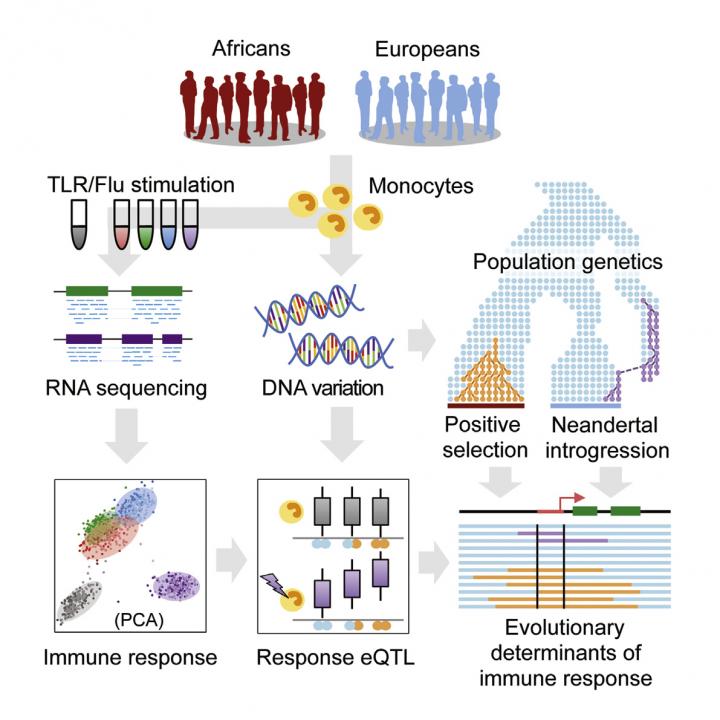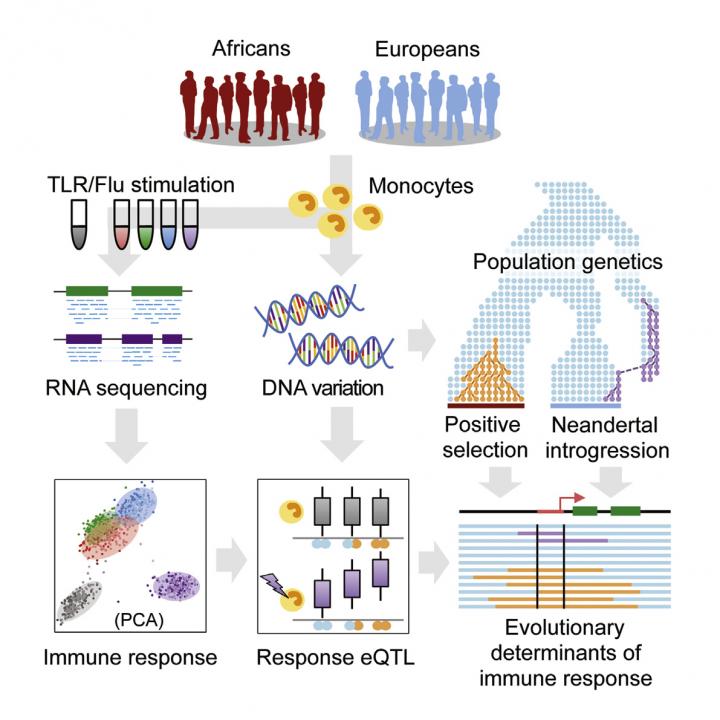
Credit: Quach et al./Cell 2016
It's long been clear that people from different parts of the world differ in their susceptibility to developing infections as well as chronic inflammatory and autoimmune diseases. Now, two studies reported in Cell on October 20 show that those differences in disease susceptibility can be traced in large part to differences at the genetic level directing the way the immune systems of people with European and African ancestry are put together.
The researchers also found that differences between populations have been selected for over time because they conferred advantages to people facing distinct health challenges in the places where they lived. As a result, according to the new evidence, people of African ancestry generally show stronger immune responses than Europeans do.
The discovery suggests that European populations have been selected to display reduced immune responses since our ancestors first made their way out of Africa. Intriguingly, the immune systems of Europeans were partly shaped by the introduction of new genetic variants through interbreeding between some of our early European ancestors and Neanderthals.
"Our findings show that population differences in transcriptional responses to immune activation are widespread, and that they are mainly accounted for by genetic variants that differ in their frequencies between human populations," said Lluis Quintana-Murci of Institut Pasteur and CNRS in Paris, France, who led one of the two studies.
"I was expecting to see ancestry-associated differences in immune response but not such a clear trend towards an overall stronger response to infection among individuals of African descent," added Luis Barreiro of the University of Montreal and the CHU Sainte-Justine in Canada, senior author of the other study.
Quintana-Murci and colleagues used RNA-sequencing to characterize the way that immune cells, known as primary monocytes, derived from 200 people of self-reported African or European ancestry would respond to attack by a bacteria or a virus. The researchers detected many differences in the activity of particular genes in those immune cells both within and between populations. They also discovered that changes in a single gene encoding an important immune receptor lead to decreased inflammation only in Europeans.
The researchers found strong evidence of selection on genes that control the immune response. Their evidence also shows that Europeans "borrowed" some key regulatory variants from Neanderthals, which in particular affect the way their immune systems respond to viral challenges.
Barreiro and colleagues took a similar approach to test for the effects of African versus European ancestry on changes in the activity of immune cells. His group focused on another type of immune cell known as primary macrophages and their response to live bacterial pathogens.
The researchers infected macrophages derived from 80 African and 95 European individuals with either Listeria monocytogenes or Salmonella typhimurium to look for differences in response and related them to ancestry. Their studies identified thousands of genes showing population differences in transcriptional response to infection. They also found that African ancestry is associated with a stronger inflammatory response, which limited the growth of bacteria.
In many cases, the activity of particular genes was tied to a single genetic variant, with strong differences in frequency between European and African populations. The researchers also observed the signature of past selection on those genes and additional evidence for an important role of genetic variants passed on to modern humans from Neanderthals. "This strongly suggests that a diminished inflammatory response has conferred a selective advantage to European populations,"Quintana-Murci said.
"The genetic and molecular basis of ancestry-related differences in disease susceptibility has been a mystery," Barreiro said. "These results provide a first description of differences in immune response and associated genetic basis that might explain differences in susceptibility to disease between people of African and European ancestry. More generally, our results demonstrate how historical selective events continue to shape human phenotypic diversity today, including for traits that are key to controlling infection."
The researchers noted that the two studies made strikingly similar findings despite the fact that they focused on different types of immune cells. They say that more work is now needed to better understand the role of environmental and other factors, including epigenetic changes, in the differences they've observed.
###
Cell, Quach, Rotival, Pothlichet, Loh et al.: "Genetic Adaptation and Neandertal Admixture Shaped the Immune System of Human Populations" http://www.cell.com/cell/fulltext/S0092-8674(16)31306-X, DOI: 10.1016/j.cell.2016.09.024
Cell, Nédélec, Sanz, and Baharian et al.: "Genetic ancestry and natural selection drive population differences in immune responses to pathogens." http://www.cell.com/cell/fulltext/S0092-8674(16)31307-1, DOI: 10.1016/j.cell.2016.09.025
Cell (@CellCellPress), the flagship journal of Cell Press, is a bimonthly journal that publishes findings of unusual significance in any area of experimental biology, including but not limited to cell biology, molecular biology, neuroscience, immunology, virology and microbiology, cancer, human genetics, systems biology, signaling, and disease mechanisms and therapeutics. Visit: http://www.cell.com/cell. To receive Cell Press media alerts, contact [email protected].
Media Contact
Joseph Caputo
[email protected]
617-397-2802
@CellPressNews
http://www.cellpress.com
The post Europeans and Africans have different immune systems, and neanderthals are partly to thank appeared first on Scienmag.





